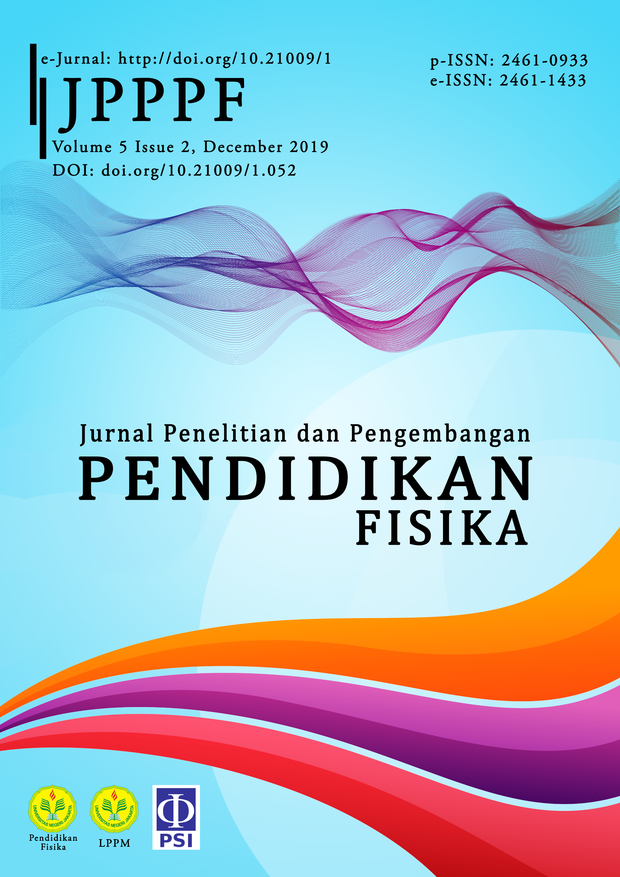Development of Interactive Physics Mobile Learning Media for Enhancing Students’ HOTS in Impulse and Momentum with Scaffolding Learning Approach
DOI:
https://doi.org/10.21009/1.05207Keywords:
media, mobile learning, interactive, scaffolding approach, hihigher-order thinking skillsAbstract
The study objectives are to (1) produce an android-based Interactive Physics Mobile Learning Media (IPMLM) product in impulse and momentum material that is feasible to improve higher-order thinking skills (HOTS) of high school students; (2) know the effectiveness of android-based IPMLM in impulse and momentum material with a scaffolding approach toward HOTS of high school students. This research was Research and Development (R&D) with a 4D model. The development steps were: (1) Defining, including needs analysis activities; (2) Designing, the selection and design of research instruments and IPMLM activities; (4) Developing, an activity of developing research instruments and IPMLM, assessment of the feasibility of learning instruments, validation of research instruments, and assessment of the feasibility of IPMLM by experts, limited tests, and extensive tests; (4) Disseminating, an IPMLM dissemination activity. IPMLM feasibility assessment was carried out to determine the feasibility of IPMLM. Products that have been assessed by experts were further limited and extensively tested. The limited test subjects consisted of 13 students in the SMA Yayasan Pendidikan Kristen, Pontianak, while the extensive test subjects consisted of 48 students in SMA Koperasi Pontianak. The results show: (1) IPMLM is feasible to be used for enhancing students’ HOTS with “very feasible” criteria based on expert judgment; (2) IPMLM is effective for enhancing students' HOTS. The learning process assisted by IPMLM media with a scaffolding approach can help student complete tasks in the HOTS aspect and improve learning with 21st-century learning-based activities.
References
Adi, NP, Suparno 2017, ‘Physics comprehensive and contextual teaching material (PhysCCTM) untuk meningkatkan higher order thinking skills (HOTS) Siswa SMA’, Seminar Nasional Fisika dan Aplikasinya, viewed 20 September 2019, https://jurnal.uns.ac.id/prosidingsnfa/article/view/16388.
Agustihana, S, Suparno 2018, ‘Effectiveness of physics mobile learning media to improve higher order thinking skills of students in thermodynamics’, In Journal of Physics: Conference Series, viewed 29 September 2019, https://iopscience.iop.org/article/10.1088/1742-6596/1097/1/012031/meta.
Aiken, LR 1985, ‘Three coefficients for analyzing the reliability and validity of ratings’, Educational and psychological measurement, vol.45, no. 1, pp.131-142.
Alfi, S, Suparno 2018, ‘Development of physics mobile learning media interactive through scaffolding approach’, In International Journal of Sciences: Basic and Applied Research (IJSBAR), vol. 37, no. 3, 20192225.
Anghileri, J 2006, ‘Scaffolding practices that enhance mathematics learning’, Journal of Mathematics Teacher Education, vol. 9, no. 1, pp.33-52.
Ariani, MD, Baidowi, B, & Azmi, S 2014, ‘Penerapan pembelajaran dengan bantuan bertahap (scaffolding) untuk meningkatkan aktivitas dan prestasi belajar matematikan siswa pada materi pokok trigonometri kelas XB semester II SMA N 2 Labuapi tahun pelajaran 2013/2014’, JURNAL PIJAR MIPA, vol. 9, no. 2.
Arifin, WN, Yusoff, MSB 2017, ‘Item response theory for medical educationists’, Education in Medicine Journal, vol. 9, no. 3, pp.69-81.
Badan Standar Nasional Pendidikan 2016, Standar kompetensi dan kompetensi dasar mata pelajaran fisika untuk SMA dan MA, Jakarta-Depdiknas.
Brookhart, SM 2010, How to assess higher order thinking skills in your classroom, Alexandria, ASCD.
Chotirat, S, Teosakul 2017, ‘Scaffolding as means of enhancing learning motivation in a reading class’, Interntionala Journal of Innovative Studies in Sociology and Humanities (IJISSH), vol. 2, no. 5.
Djudin, T 2013, Statistika parametrik, Yogyakarta, Tiara Wacana.
Fisher, A 2011, Critical thinking: An introduction, Cambridge University Press.
Hwang, GJ, Wu, PH 2014 ‘Applications, impacts and trends of mobile technology-enhanced learning: a review of 2008–2012 publications in selected SSCI journals’, International Journal of Mobile Learning and Organisation, vol. 8, no. 2, pp.83-95.
Istiyono, E 2017, ‘The analysis of senior high school students’ physics HOTS in Bantul District measured using PhysReMChoTHOTS’, In AIP Conference Proceedings, viewed 19 September 2019, https://aip.scitation.org/doi/abs/10.1063/1.4995184.
Krathwohl, DR 2002, ‘A revision of Bloom's taxonomy: An overview’, Theory into practice, vol. 41, no. 4, pp.212-218.
Mardiana, N, Kuswanto, H 2017, ‘Android-assisted physics mobile learning to improve senior high school students’ divergent thinking skills and physics HOTS’, In AIP Conference Proceedings, viewed 20 September 2019, https://aip.scitation.org/doi/abs/10.1063/1.4995181.
McDevitt, TM, Omrod, JE, 2014, Child development and education, New Jersey, Pearson Education, Inc.
Nurhayati, E 2016, ‘Penerapan scaffolding untuk pencapaian kemampuan pemecahan masalah matematis’, Jurnal Penelitian Pendidikan dan Pengajaran Matematika, vol. 2, no. 2, pp.107-112.
O’Sullivan 2018, Developing the cambridge learner attributes guide, viewed 15 September 2019, https://www.cambridgeinternational.org/Images/417069-developing-the-cambridge-learner-attributes-.pdf.
Pee, B, Woodman, Fry, TH, & Davenport, ES 2002, ‘Appraising and assessing reflection in students' writing on a structured worksheet’, Medical education, vol. 36, no. 6, pp.575-585.
Sari, ALR 2018, Analisis kemampuan berpikir kritis dan pemahaman konsep siswa dalam materi Hukum Newton pada model pembelajaran inkuiri terbimbing dengan multirepresentasi’, Doctoral thesis, viewed 15 September 2019, http://karya-ilmiah.um.ac.id/index.php/disertasi/article/view/65423.
Sharma, P, Hannafin, MJ 2007, ‘Scaffolding in technology-enhanced learning environments’, Interactive learning environments, vol. 15, no. 1, pp.27-46.
Subali, B, Suyata, P 2011, ‘Panduan analisis data pengukuran pendidikan untuk memperoleh bukti empirik kesahihan menggunakan program QUEST’, Yogyakarta, LPPM Universitas Negeri Yogyakarta.
Sugiyono 2016, Metode penelitian kombinasi, Bandung, Alfabeta.
Sumintono, B, Widhiarso, W 2015, ‘Aplikasi pemodelan rasch pada asesmen pendidikan’, Cimahi, Trim Komunikata Publishing House.
Thiagarajan, S, Semmel, DS, & Semmel, MI 1974, Instructional development for training teacher of exceptional children: A Sourcebook, Indiana, Indiana University.
Ulfa, AM, Sugiyarto, KH, & Ikhsan, J 2017, ‘The effect of the use of android-based application in learning together to improve students’ academic performance’, In AIP Conference Proceedings, viewed 19 September 2019, https://aip.scitation.org/doi/abs/10.1063/1.4983910.
Widoyoko, EKS 2012, ‘Evaluasi program pembelajaran’, Yogyakarta, Pustaka Pelajar.
Yang, YTC 2012, ‘Building virtual cities, inspiring intelligent citizens: Digital games for developing students’ problem solving and learning motivation’, Computers & Education, vol. 59, no. 2, pp.365-377.











